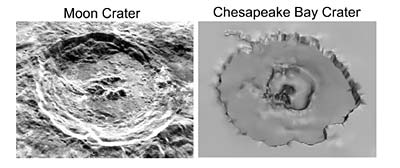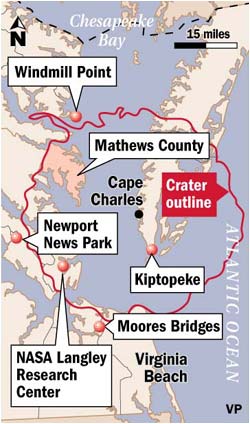It looks like you're using an Ad Blocker.
Please white-list or disable AboveTopSecret.com in your ad-blocking tool.
Thank you.
Some features of ATS will be disabled while you continue to use an ad-blocker.
13
share:
I find it interesting that with all the predictions and fears going around that there hasnt really been much mention of this. It explains quite a few
things regarding why foundations go bad and sinkholes happen out of seemingly nowhere as well as the earthquake(s) we had here in VA. I live in
Norfolk and i grew up with a lake in my backyard and never knew our pretty (and rather stinky) lake was likely because of this event somehow. I have
quite a collection of interesting stones from my current location as well as the backyard with the lake. It really did not surprise me but what does
surprise me is the fact I never heard about this before.
Chesapeake Bay impact crater info
From the far reaches of space, a bolide (comet or asteroid), 3-5 kilometers in diameter, swooped through the Earth's atmosphere and blasted an enormous crater into the continental shelf. The crater is now approximately 200 km southeast of Washington, D.C., and is buried 300-500 meters beneath the southern part of Chesapeake Bay and the peninsulas of southeastern Virginia..
Chesapeake Bay impact crater info
reply to post by rbkruspe
I live in Hampton. That asteroid fell right on top on my house. ( or where my house would eventually be in 1914) I never knew this about the bay. Very interesting. To think that where my house is right now was once under the ocean. Things sure can change a lot in 35 million years.
I live in Hampton. That asteroid fell right on top on my house. ( or where my house would eventually be in 1914) I never knew this about the bay. Very interesting. To think that where my house is right now was once under the ocean. Things sure can change a lot in 35 million years.
Fellow Virginian checking in. I read that the East coast of North Carolina is dotted with lakes and swamps from multiple meteor impacts.
Without the ChesBay there wouldn't be much to Virginia. The first permanent settlements by Europeans started here and were sustained by the fish and shellfish in the bay.
It must have been hellish when it hit but it sure left a great environment for us to enjoy (provided we don't destroy it with pollution and sediments).
Without the ChesBay there wouldn't be much to Virginia. The first permanent settlements by Europeans started here and were sustained by the fish and shellfish in the bay.
It must have been hellish when it hit but it sure left a great environment for us to enjoy (provided we don't destroy it with pollution and sediments).
reply to post by rbkruspe
Star and flag for bringing this information to light on this forum. It's so refreshing to see a post like this on Fragile Earth as it really reminds us how fragile the earth is and subject to so many different forces from different sources that shape it from past to present to future. It's amazing to see how an event so many millions of years ago continues to influence lives into the present and could be related to recent news-making events. I have loved the Chesapeake all my life and enjoyed it and donated for its preservation when I could and altered my behaviors that I learned could impact the Bay. I don't think I've ever taken it for granted, yet here you go and find something utterly astonishing I had never heard or even suspected about this beloved local treasure! Thank you for the find and for sharing. I'm surprised I'd not heard of it either. I wonder if I've had my head up my rear in too much doom and gloom oriented science news.
Star and flag for bringing this information to light on this forum. It's so refreshing to see a post like this on Fragile Earth as it really reminds us how fragile the earth is and subject to so many different forces from different sources that shape it from past to present to future. It's amazing to see how an event so many millions of years ago continues to influence lives into the present and could be related to recent news-making events. I have loved the Chesapeake all my life and enjoyed it and donated for its preservation when I could and altered my behaviors that I learned could impact the Bay. I don't think I've ever taken it for granted, yet here you go and find something utterly astonishing I had never heard or even suspected about this beloved local treasure! Thank you for the find and for sharing. I'm surprised I'd not heard of it either. I wonder if I've had my head up my rear in too much doom and gloom oriented science news.
I'd read about this a long time ago, and had kind of forgotten. So S&F for the thread. It's a very interesting subject!
news.nationalgeographic.com...
A 2 million-year-long comet shower? Holy... Let's hope one of those doesn't cross our path anytime soon.
Because there was ocean water there at the time, this impact also created megatsunamis- walls of water probably hundreds if not a thousand feet high! They think it destroyed everything on the east coast. Pretty darn massive. Humanity has really had a cakewalk of existence on this planet so far, except maybe for the eruption of Toba, and a few other events like the 2004 tsunami. How fragile and vulnerable it all is- to extinction in an instant. But if it happened before, the chances are that it will happen again. One day.
The asteroid or comet that struck the area that later became the Chesapeake Bay may be evidence of a 2 million-year-long comet shower that scientists think may have occurred between 36 and 34 million years ago. An even bigger crater in Popigai, northern Siberia, was created at about the same time. Scientists also have found traces of helium 3, an isotope associated with extraterrestrial objects, in sediment layers in Massignano, Italy, and other places dating to 35 million years ago.
news.nationalgeographic.com...
A 2 million-year-long comet shower? Holy... Let's hope one of those doesn't cross our path anytime soon.
Because there was ocean water there at the time, this impact also created megatsunamis- walls of water probably hundreds if not a thousand feet high! They think it destroyed everything on the east coast. Pretty darn massive. Humanity has really had a cakewalk of existence on this planet so far, except maybe for the eruption of Toba, and a few other events like the 2004 tsunami. How fragile and vulnerable it all is- to extinction in an instant. But if it happened before, the chances are that it will happen again. One day.
reply to post by TrueAmerican
Thank you!
It's interesting how it has rendered the bay and it's oxygen levels and life altered. Now with humans causing pollution and such, the oxygen levels in the water are getting dangerously low in some areas.
Thank you!
It's interesting how it has rendered the bay and it's oxygen levels and life altered. Now with humans causing pollution and such, the oxygen levels in the water are getting dangerously low in some areas.
reply to post by rbkruspe
I have not really sat down and thought about how the geography of our area formed. So this is an interesting read to me and I thank you for bringing it here and sharing. I found a few more pics to show the crater info and I am adding them to your thread.


source
:-)
leolady
I have not really sat down and thought about how the geography of our area formed. So this is an interesting read to me and I thank you for bringing it here and sharing. I found a few more pics to show the crater info and I am adding them to your thread.


After the meteorite hit, water blasted out of the area and then sucked in whatever would fill its enormous chasm. Sediments laid down over 35 million years filled in the area in a jumble and compacted the crater debris. Despite all of the matter that was brought into the crater, it continues to be a low spot in the floor of what is now the Chesapeake Bay.
Water flows to the lowest ground, and rivers are no exception. The Rappahannock, York and James rivers turned toward the crater, as they continue to do today. Without the crater, the Virginia port of Hampton Roads would not exist. Without it, the shores of the world's greatest military harbor would simply have been cut through by the relentless drain of the James on its way to the sea.
source
:-)
leolady
new topics
-
President BIDEN's FBI Raided Donald Trump's Florida Home for OBAMA-NORTH KOREA Documents.
Political Conspiracies: 4 hours ago -
Maestro Benedetto
Literature: 5 hours ago -
Is AI Better Than the Hollywood Elite?
Movies: 6 hours ago -
Las Vegas UFO Spotting Teen Traumatized by Demon Creature in Backyard
Aliens and UFOs: 9 hours ago -
2024 Pigeon Forge Rod Run - On the Strip (Video made for you)
Automotive Discussion: 10 hours ago -
Gaza Terrorists Attack US Humanitarian Pier During Construction
Middle East Issues: 10 hours ago -
The functionality of boldening and italics is clunky and no post char limit warning?
ATS Freshman's Forum: 11 hours ago
top topics
-
President BIDEN's FBI Raided Donald Trump's Florida Home for OBAMA-NORTH KOREA Documents.
Political Conspiracies: 4 hours ago, 25 flags -
Krystalnacht on today's most elite Universities?
Social Issues and Civil Unrest: 15 hours ago, 9 flags -
Supreme Court Oral Arguments 4.25.2024 - Are PRESIDENTS IMMUNE From Later Being Prosecuted.
Above Politics: 15 hours ago, 8 flags -
Weinstein's conviction overturned
Mainstream News: 13 hours ago, 8 flags -
Massachusetts Drag Queen Leads Young Kids in Free Palestine Chant
Social Issues and Civil Unrest: 12 hours ago, 7 flags -
Gaza Terrorists Attack US Humanitarian Pier During Construction
Middle East Issues: 10 hours ago, 7 flags -
Las Vegas UFO Spotting Teen Traumatized by Demon Creature in Backyard
Aliens and UFOs: 9 hours ago, 6 flags -
Meadows, Giuliani Among 11 Indicted in Arizona in Latest 2020 Election Subversion Case
Mainstream News: 12 hours ago, 5 flags -
2024 Pigeon Forge Rod Run - On the Strip (Video made for you)
Automotive Discussion: 10 hours ago, 4 flags -
Is AI Better Than the Hollywood Elite?
Movies: 6 hours ago, 3 flags
active topics
-
Supreme Court Oral Arguments 4.25.2024 - Are PRESIDENTS IMMUNE From Later Being Prosecuted.
Above Politics • 88 • : Irishhaf -
SHORT STORY WRITERS CONTEST -- April 2024 -- TIME -- TIME2024
Short Stories • 23 • : DontTreadOnMe -
President BIDEN's FBI Raided Donald Trump's Florida Home for OBAMA-NORTH KOREA Documents.
Political Conspiracies • 16 • : Astyanax -
Truth Social goes public, be careful not to lose your money
Mainstream News • 130 • : Astyanax -
Las Vegas UFO Spotting Teen Traumatized by Demon Creature in Backyard
Aliens and UFOs • 11 • : AwakeNotWoke -
Is AI Better Than the Hollywood Elite?
Movies • 13 • : Justoneman -
Hate makes for strange bedfellows
US Political Madness • 47 • : 19Bones79 -
-@TH3WH17ERABB17- -Q- ---TIME TO SHOW THE WORLD--- -Part- --44--
Dissecting Disinformation • 689 • : daskakik -
University of Texas Instantly Shuts Down Anti Israel Protests
Education and Media • 265 • : Astrocometus -
Gaza Terrorists Attack US Humanitarian Pier During Construction
Middle East Issues • 27 • : ToneD
13
